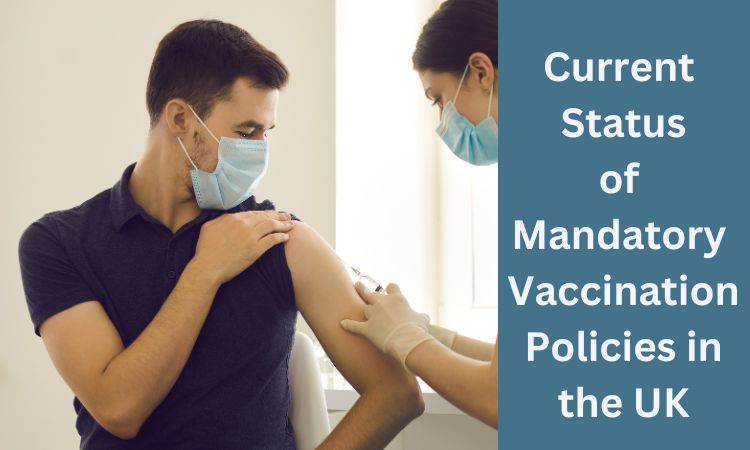The global pandemic caused by COVID-19 has caused significant workplace disruptions worldwide. The continuous increase in the danger of one person getting diagnosed with COVID and causing the spread of the virus in the entire workplace has made employers rethink their strategy for dealing with the situation without any long-term consequences to their company.
One of the most recurring questions that arise is whether it can be made mandatory by the owners of the business for their employees to get vaccinated. As we have witnessed over the last few years, the answer to that is yes. With the development of COVID-19 vaccines, many employers have considered making vaccinations mandatory for their employees.
This article will explore the practical, ethical, and legal considerations of mandatory COVID vaccinations in the workplace. I will explain the current status, benefits, drawbacks, and legal/ethical implications of mandatory COVID vaccinations for employees.
Current Status of Mandatory Vaccination Policies in the UK

In the United Kingdom, no law currently makes COVID vaccinations mandatory for employees. However, some employers in the UK have chosen to implement mandatory vaccination policies for their employees.
For instance, some care home providers have implemented policies mandating that all staff members receive the COVID-19 vaccine. Some airlines have made it necessary for their staff members to receive the vaccine. However, such policies remain controversial and face legal and moral obstacles around individual rights and discrimination.
Employers with mandatory vaccination policies should seek legal advice and communicate clearly with employees about the reasons for the policy. They should also respond to any employee queries or concerns.
Check out: Guide to Occupational Health At Work
Legal Considerations for Workplace Vaccination Policies
Under the Health and Safety at Work Act 1974, employers have a duty of care to ensure their employees’ health, safety, and welfare. This includes taking reasonable steps to protect employees from harm, including the risk of COVID-19.
There may be situations where a mandatory vaccination policy is justified on health and safety grounds, even though employers are not legally required to make COVID-19 vaccinations mandatory.
However, when making vaccination policies mandatory, employers should also be mindful of the legal risks. Here are some legal considerations that employers should keep in mind:
1. Discrimination:
Employers must ensure that their vaccination policies do not discriminate against any groups, such as those with religious objections or disabilities. To ensure that workers who cannot get vaccinations are given reasonable accommodations, employers must take the necessary steps.
2. Privacy:
Employers must comply with data protection laws when handling employees’ health information. Employers should also obtain employees’ consent before collecting and disclosing their health information.
3. Employment Contracts:
Employers may modify their employment contracts or policies to include vaccination requirements. They should ensure that these modifications are conveyed to employees so that they do not breach any newly appointed policies.
Employers should get legal advice before implementing mandatory vaccination policies to ensure no relevant laws or regulations are broken. Employers should also communicate clearly with their employees about the purpose behind the policy and provide support to any employees who may have concerns or are not in favour.
Pros And Cons of Mandatory Vaccination Policies
Mandatory COVID-19 vaccinations in the workplace can have significant public health benefits as well as a couple of drawbacks. Here are some of the pros and cons to consider while making vaccinations mandatory:
Advantages:
- Improved safety: Once the company owners have made vaccinations mandatory, there will be minimum chances of COVID-19 contaminating the workplace. Both employees and customers will have a sense of safety while entering the premises.
- Legal protection: Employers who require vaccinations may be better protected against liability claims related to COVID-19 infections. They also have the higher ground in the legal sense if any health-related accusation arises against them, making the risk of them getting sued for health violations minimum.
- Increased productivity: A vaccinated workforce may experience fewer absences due to illness, improving overall productivity.
Disadvantages:
- Employee resistance: Some employees may be hesitant or refuse to get vaccinated, causing tension and lowering morale in the workplace.
- Legal risks: Poor implementation of mandatory vaccination policies can lead to legal risks, including claims of discrimination or privacy violations.
- Ethical concerns: Some may view mandatory vaccination policies as infringing on individual rights and freedoms, particularly if they are not legally mandated.
Employers should carefully weigh the pros and cons of mandatory vaccination policies. They should consider their specific industry, workforce, and company culture.
Employers should also seek legal advice, start open communication with their employees about the reasons for implementing the policy, and support employees with concerns.
Promoting Vaccinations In A Discreet Manner

Employers can take several measures to promote COVID-19 vaccination policies and persuade their employees to get vaccinated discreetly. These include:
- Providing information and education: Employers can provide information about the COVID-19 vaccine to address concerns and increase employee confidence. This education can also promote caution among employees by highlighting the virus’s severe effects.
- Offering incentives: Employers may provide incentives like paid time off or financial rewards to encourage their employees to vaccinate. This would push the majority of the employees to get vaccinated and would promote a more healthy workplace.
- Voluntary vaccination programs: Employers may offer optional vaccination programs in the workplace, like on-site vaccination clinics, to make it easier for employees to get vaccinated. Many organisations have utilised this measure to ensure everyone gets vaccinated without employees needing to give up extra time from their lifestyles to get vaccinated.
- Promote SOPs: Employers should promote all SOPs, including wearing masks, using hand sanitisers and maintaining distance from each other, even for those vaccinated, to promote a workplace where the lowest chance of infection exists.
- Imposing testing requirements: Employers may make it mandatory for employees who choose not to get vaccinated to undergo regular COVID-19 tests to detect and prevent the spread of the virus.
By adopting these approaches, employers can encourage their staff to get vaccinated. These measures can also enhance workplace safety and decrease the risk of COVID-19 outbreaks.
Employee Rights

Employers should be mindful of their employees’ rights. They have to remain within the boundaries of these rights and ensure they are not violating them. Here are a few relevant employee rights:
Workers can decline the COVID-19 vaccine even if their company implements a compulsory vaccination policy. This is because vaccination is a medical decision, and people have the right to choose what happens to their bodies.
Employers must also ensure the confidentiality and privacy of employee health information, including vaccination status. This means that employers cannot share an employee’s vaccination status with others without their consent, except when necessary to protect the health and safety of others.
Employers can also not share any special condition of the employee with others, as this would be an invasion of privacy.
Employees concerned about the mandatory vaccination policy should discuss their concerns with their employer and seek legal advice if needed. They may also ask for reasonable accommodations under the Equality Act 2010 if they have a disability or other special situation that makes vaccination difficult or impossible for them to take.
Employers should ensure that they provide accommodations to the person who refuses to get vaccinated to prevent any disruption in the workplace.
Here are a few possible ways employers can do this
- Remote work: In cases where an employee’s job responsibilities can be performed remotely, employers may consider allowing the employee to work from home. This could minimise the risk of transmission to other employees while enabling the unvaccinated employee to perform their job duties.
- Personal Protective Equipment (PPE): Employers can consider providing unvaccinated employees with PPE such as masks, gloves, face shields, or other protective gear. This can help protect them from exposure to the virus and reduce the risk of transmission to others.
- Testing: Employers can make unvaccinated employees undergo regular COVID-19 testing to identify early cases and prevent transmission to other employees.
- Alternative work arrangements: Employers may offer alternative work arrangements for unvaccinated employees, such as modified schedules, workstations in isolated areas, or different job duties. This could help to minimize exposure to the virus and protect other employees.
What discrimination issues might arise with mandatory vaccination?
There are concerns that mandatory vaccination policies may lead to discrimination against certain individuals or groups who are unable or unwilling to receive the vaccine for various reasons, such as religious beliefs or medical conditions.
Employers must make reasonable adjustments for employees who cannot receive the vaccine because of a disability or religious belief. The Equality Act 2010 prohibits discrimination based on these characteristics in the UK.
Therefore, employers implementing mandatory vaccination policies should ensure they do not indirectly discriminate against any group or individual. Failure to consider these issues and provide necessary accommodations may result in legal action.
How can employers encourage their employees to get vaccinated?
Employers can use various measures to promote vaccination, such as education and awareness campaigns, incentives such as paid time off or bonuses and implementing policies to reduce COVID-19 transmission risks. Employers may refer employees to nearby vaccination centres or offer on-site vaccination clinics.
Conclusion
Making COVID vaccinations mandatory for employers has different perspectives and requires careful consideration. The condition of mandating vaccinations depends on the specific circumstances, and employers should ensure that their policies comply with applicable regulations and legislation.
Employers can mandate vaccinations by taking certain promotional steps, such as communication and education efforts, incentives, and changing workplace policies. It is critical for employers to prioritise the health and safety of their employees, customers, and visitors and to engage in open communication with employees regarding any measures implemented.
To adapt their policies and practices accordingly, employers must stay up-to-date with the latest legislation, guidance, and best practices.
I hope now you have got the idea about whether can employers make Covid Vaccination mandatory for employees. Plus, with the given tips and details, it’s best to follow the legal laws.
Frequently Asked Questions (FAQs)
Employers may require vaccinations in certain circumstances. Employers must ensure the health and safety of their employees, customers, and visitors and may require vaccinations for roles that present a high risk of COVID-19 transmission or exposure.
However, any mandatory vaccination policy must comply with relevant laws and regulations, and employers should consider the risks and benefits of such a policy before implementing it.
Employees have the right to refuse vaccination based on medical or religious reasons. Employers must provide reasonable accommodations for these requests. In situations where health and safety risks are high, and there is no way around firing the employee, employers should be able to justify terminating the employment of an unvaccinated employee.
Employers may require proof of vaccination in certain circumstances, such as job interviews and other instances. Employers must ensure that any collection or use of vaccination data complies with data protection laws and regulations.
Employers should speak with unvaccinated employees to understand their reasons and explore possible accommodations. If there is a significant health and safety risk, employers may be able to justify disciplinary action or, in extreme cases, terminate employment.
If the situation is workable, employers should provide accommodations to the employees so they can work in a way that is not harmful to the workplace.









